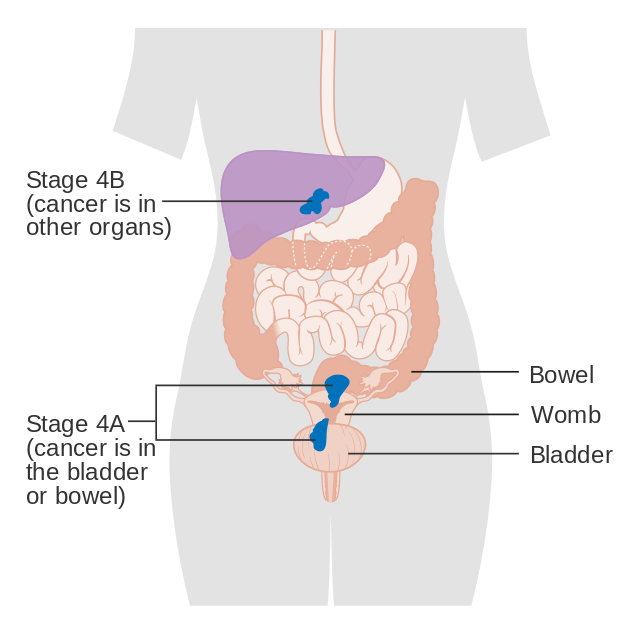Stage 4 Endometrial Cancer is cancer that began in the tissue lining of the uterus and has spread beyond your pelvis. Also referred to as Metastatic Endometrial Cancer. Stage 4 is divided into Stage 4A and Stage 4B based on how far the cancer has spread.
Understanding your Stage 4 Endometrial Cancer diagnosis will help you partner with your doctors to make the best treatment choice for you. Tap “Listen Now” for an overview of Stage 4 Endometrial Cancer.- Stage 4A Endometrial Cancer
- Stage 4B Endometrial Cancer
Overview
Stage 4A Endometrial Cancer diagnosis means that the cancer, shown here at the bottom of the image in blue, has spread into your bladder and/or into your bowel wall.
What Tests Will I Need and Why?
Blood and Imaging tests are done to understand your general health, confirm your diagnosis and determine your cancer stage.
Tissue analysis is also typically done to identify certain biomarkers, which is critical to finding the best treatment option for you. In Endometrial Cancer, there are 2 common biomarkers that can be found: Microsatellite Instability High (MSI-H) and HER2. 30% of Endometrial Cancers have MSI-H.
If your treatment team has not already performed tests to determine your cancer’s features, please ask your doctor when these tests will be performed.
Re-read this summary as needed and then tap, “Compare My Treatment Options Now“. Our unique Comparison Page will help you understand your FDA-approved treatment options including, who can help you pay for your treatment, where and how each is given and what side-effects you may experience.

Cancer Research U.K. CC BY-SA 4
Overview
Stage 4B Endometrial Cancer diagnosis means that the primary cancer has spread to your lymph nodes outside of your pelvis and abdomen, or to other organs in your body such as your liver, lungs or bones.
What Tests Will I Need and Why?
Blood and Imaging tests are done to understand your general health, confirm your diagnosis and determine your cancer stage.
Tissue analysis is also typically done to identify certain biomarkers, which is critical to finding the best treatment option for you. In Endometrial Cancer, there are 2 common biomarkers that can be found: Microsatellite Instability High (MSI-H) and HER2. 30% of Endometrial Cancers have MSI-H.
If your treatment team has not already performed tests to determine your cancer’s features, please ask your doctor when these tests will be performed.
Re-read this summary as needed and then tap, “Compare My Treatment Options Now“. Our unique Comparison Page will help you understand your FDA-approved treatment options including, who can help you pay for your treatment, where and how each is given and what side-effects you may experience.

Cancer Research U.K. CC BY-SA 4
Recommended Endometrial Cancer Videos

Endometrial Cancer In The Black Community
Brought To You By Black Health Matters

Endometrial Cancer Overview
CDC Did You Know Series

How Cancer Spreads
Metastatic = Advanced

Diagnosing Your Cancer
How Does a PET Scan Work?

Diagnosing Your Cancer
How Does a CT Scan Work?

Exercise! You Can Do It
Reducing Side Effects & More
Commonly Searched Questions
Stage 4 Endometrial Cancer Survival Rate
Source: Cancer.gov
Stage 4 Endometrial Cancer Symptoms
Source: Cancer.org
Stage 4 Endometrial Cancer Treatment
Source: Cancer.org
Stage 4 Endometrial Cancer Definition
Source: Cancer.org
Stage 4 Endometrial Cancer Recurrence Rate
Source: Cancer.org
Stage 4 Endometrial Cancer Prevention
- Maintain a Healthy Weight: Obesity increases the risk of endometrial cancer.
- Manage Diabetes: Proper management of diabetes can help reduce cancer risk.
- Use Birth Control Pills: Oral contraceptives may reduce the risk.
- Discuss Hormone Therapy: Talk to your doctor about the risks of hormone replacement therapy.
Source: Cancer.org













